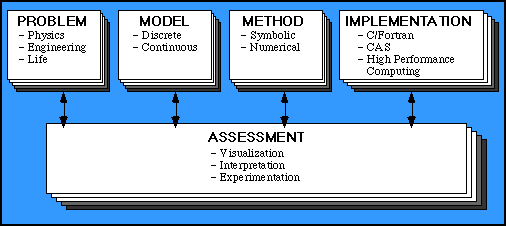
This project promtes the emerging field of computational science as an interdisciplinary/multidisciplinary approach to scientific analysis. Currently our emphasis is on collecting, developing and distributing a set of educational materials in computational science.
In order to make these educational materials useful to as wide a range of people as possible, we believe they should be problem driven, modular in format, and as interactive as possible. These modular materials will be logically grouped into courses, with the first planned course at the introductory level targeted towards freshmen and sophomores. The computational topics in each "course" will be introduced and developed in the context of specific problems and examples drawn from as wide a variety of relevant fields as possible, thus stressing the interdisciplinary nature of computational science. Each example will be in an independent module that includes most or all of the necessary code, and which can be executed in an interactive fashion. These interactive modules will be designed to stress the journey from physical problem to computational solution (with ongoing feedback for assessment) as illustrated in the figure.

The course materials will also include descriptions of the various "guiding themes" of computational science, such as high performance computing architectures and scientific visualization. These modules will be more "essay-like" in nature, and are meant to provide breadth and cohesion by intertwining separate examples and showing their inter-relation.
Working in concert with the authors, all materials submitted to the project will be assembled into modular form, and a "flow chart" of the modules will be created. However, this project is more than an electronic library where software is collected and distributed; the materials will be organized around course outlines and provide completed course examples with detailed outlines and associated modules. We recognize that "real world" courses must differ, so the outlines will serve as a framework on which similar, but not identical courses can be constructed. To help tailor a course for specific needs we will provide a large number of problem driven software modules drawn from many disciplines. Our paradigm is that of an electronic textbook in which the instructor fills out chapters by selecting appropriate modules from the database.
As the project proceeds we expect to offer additional modules at the advanced undergraduate level, as well as special materials for both teachers and advanced high school students. It is our hope that the various modules will be contributed and utilized by scientists and educators drawn nationwide from the broad range of disciplines. In addition, the means we pursue in promoting this nascent field are not rigidly confined to providing electronic educational materials, and we welcome additional suggestions on advancing the general subject of computational science.
The materials will be available to students and educators at all levels, and will be distributed via the internet. The contributed materials will be assembled at the Ames Laboratory-USDOE. At present the project has 25+ active members drawn from small colleges, research universities, and government laboratories throughout the country.
As much as possible the archived materials will be platform independent and where that is not possible, support will be provided for a variety of platforms and software packages. To help meet this goal we have developed an X-windows "teaching tool". The teaching tool provides an interactive tutorial environment well suited for the problem driven nature of our materials. Other interactive environments, such as Mathematica notebooks, will also be supported.
We actively seek people interested in innovative ways of introducing topics in computational science into the undergraduate curriculum. Those interested in contributing additional materials or in using contributed materials for teaching elements of computational science, are encouraged to contact us and become involved in the project.
We encourage interested parties to submit materials that might further these goals. We are particularly interested in assembling as wide a range of "example" modules as possible, and actively seek problems drawn from engineering and the physical and life sciences.
For More Information. Specific information about this program can be obtained from
Dr. Thomas Marchioro
125 South 3rd, Ames Laboratory
Ames, IA 50010
Telephone (515) 294-5543
e-mail uces@uces.ameslab.gov.
This project is funded by the Department of Energy through the HPCC Initiative and the Office of Scientific Computing.